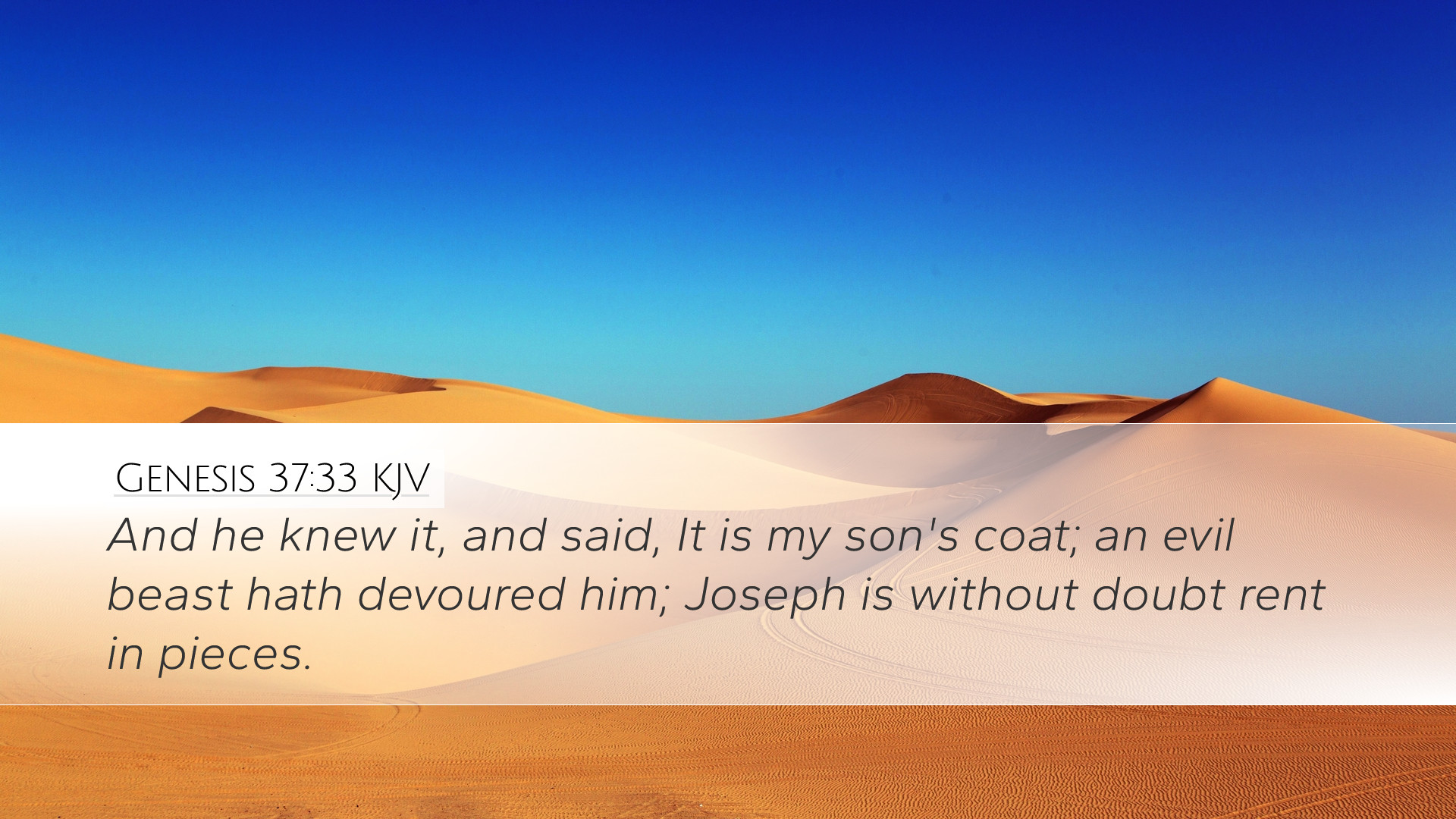Commentary on Genesis 37:33
Genesis 37:33 states:
"And he knew it, and said, It is my son's coat; an evil beast hath devoured him; Joseph is without doubt rent in pieces."
This verse occurs in the narrative surrounding the story of Joseph, a pivotal character in the biblical canon. The context is crucial as it highlights themes of deception, familial strife, and divine providence.
Contextual Setting
The backdrop of Genesis 37 is the intense sibling rivalry between Joseph and his brothers, exacerbated by Jacob’s favoritism towards Joseph, symbolized in the richly ornamented coat he bestowed upon him. Jacob's distress upon seeing the coat, stained with blood, marks a turning point not only in his life but also in Joseph's tragic journey toward eventual prominence in Egypt.
Thematic Analysis
This verse embodies several critical themes:
- Deception: The brothers' scheme to present the torn coat as evidence of Joseph's demise sets the stage for the pervading theme of deceit throughout the narrative.
- Grief: Jacob’s reaction illustrates the pain of loss, showing the deep emotional scars that deception can bring.
- Providence: While the brothers intend harm, God's overarching purpose is revealed through the events that unfold, including later reconciliation and survival amid famine.
Matthew Henry's Commentary
Matthew Henry elaborates that Jacob’s lamentation reveals not only his personal anguish but also the dimensions of paternal love. Henry remarks:
"He knew the coat; it had the marks of his son's identity. The grief of a father, particularly, when the son is lost under such implications, is heightened by the vivid reminder of his love through the coat."
Henry emphasizes the psychological impact on Jacob, as he experiences the bitterness of despair mingled with guilt for favoring Joseph over his brothers.
Albert Barnes' Commentary
Albert Barnes provides a detailed exposition of the text's implications. He notes:
"Jacob's immediate conclusion that an evil beast had devoured Joseph underscores human nature’s tendency to assume the worst, particularly in moments of distress."
Barnes further discusses the manner in which Jacob's misinterpretation of events mirrors that of many individuals facing personal and familial crises where the heart leads them to incorrect conclusions.
Adam Clarke's Commentary
Adam Clarke highlights the cultural significance of garment symbolism in ancient Israel:
"The coat, so richly adorned, signified not just familial favoritism, but also the dreams and ambitions that Joseph harbored. Its loss symbolizes a severance of hope between Jacob and his favorite son.”
Clarke argue that Jacob’s belief that a wild beast had killed Joseph was steeped in his own fears and insecurities, projecting his grief onto an imagined reality rather than confronting the betrayal by his sons.
Spiritual and Practical Lessons
For pastors and theologians, this passage serves multiple practical lessons:
- The Nature of Grief: It teaches us about the profound sorrow that comes from loss and betrayal and how these emotions can cloud our judgment.
- Consequence of Deceit: The action of the brothers serves as a cautionary tale against dishonesty and its ripple effects on relationships.
- God’s Sovereignty: It reminds us that while human actions may lead to despair, God can weave these circumstances into a tapestry of hope and restoration.
Conclusion
Genesis 37:33 encapsulates a moment of deep tragedy and deception. As scholars engage with this text, it is essential to unpack the layers of emotional truth and divine providence at play. The responses of Jacob, as examined through the insights of Matthew Henry, Albert Barnes, and Adam Clarke, encourage a rich exploration of human experience and divine oversight. The resonance of this passage in teaching, preaching, and theological reflection cannot be overstated.


